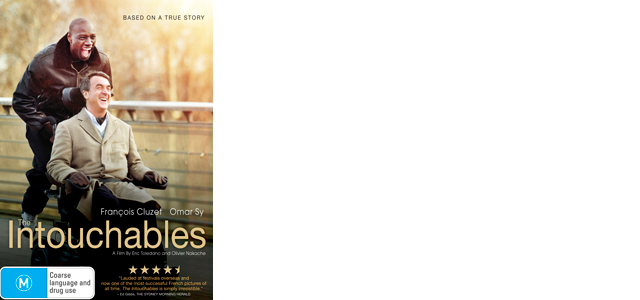(M) Roadshow DVD/BD
One of the biggest surprises in the world of cinema last year was the amazing success of the French film The Intouchables. The story of an unlikely friendship between an aristocratic quadriplegic, Philippe, and the young, black man from the projects, Driss, who he hires as his caretaker became the second highest grossing film in the history of the French cinema after only eight weeks in cinemas.
And armed with the hybrid English/French title The Intouchables (I assume they wanted to avoid being mixed up with Brian De Palma’s The Untouchables), it would go on to conquer the world, taking almost $300 million at the international box office and becoming one of the year’s most loved films.
The Intouchables is an uplifting experience. Based, loosely, on a true story (though we’ve seen similar concepts before in films like Driving Miss Daisy and Scent of a Woman), this story of a friendship that transcends socio-economic, class and race barriers makes you see the potential for good in humanity. That’s why people have responded so strongly to it. That’s why people love it.
The success or failure of a buddy movie invariably comes down to the chemistry between the two protagonists and The Intouchables has it in spades. Both François Cluzet and Omar Sy put in magnificent performances.
Cluzet, who is a dead ringer for Dustin Hoffman, has the added hurdle of being restricted to only acting from the neck up but he manages to brilliantly embody the frustrations of a man trapped in a useless body.
Sy, a French comedian, is very charismatic as Driss, who brings some colour and life into Philippe’s world. Sy won best actor at the César Awards, France’s equivalent to the Oscars, edging out not only Cluzet but also Jean Dujardin for his work in The Artist, which would go on to win him an Oscar.
It should be said, though, that as you watch The Intouchables you can feel your buttons being pushed. It is very calculated in how it goes about engaging you emotionally.
Of course, every film manipulates your emotions. The filmmaker uses the tools at their disposal to try to elicit a certain emotional response from the viewer. The key, though, is to do it subtly, so the viewer feels the emotion without feeling the manipulation. (George Lucas once said, “Emotionally involving an audience is easy. Anybody can do it blindfolded. Get a little kitten and have some guy wring its neck.”)
At times The Intouchables lacks that subtlety. There are scenes, moments and events which you can tell are there solely to make you feel something.
As lovely, positive and compassionate as this film is, there is one thing which I feel cannot pass without comment. Beneath the film’s feel-good qualities, you find something quite troubling: how much it indulges in racial stereotyping.
As loveable a character as Driss is, and as much as the film encourages us to like him, it doesn’t change the fact that we are presented with a black character who is unemployed (seemingly by choice), uncultured, a thief, a drug user, prone to using physical aggression to intimidate people, irreverent, lecherous and, of course, a great dancer (not all stereotypes are negative).
All of this in a world full of white people who are largely none of those things. Now you may be tempted to point to the fact that the film is “based on a true story” and argue therefore that if that is what he was like then that is what he was like. The problem with that argument is that it doesn’t appear that that is what he was like.
At the end of the film we are shown a short glimpse of the real life men who the characters of Philippe and Driss are based on and, guess what, the man who inspired Driss is not black.
He is an Arab named Abdel Sellou from the former French colony of Algeria. This prompts some awkward questions, particularly in a film as calculated in the way it engages with your emotions as The Intouchables is. Even if it is an accurate portrayal, with Sellou being exactly like Driss is portrayed in the film, the decision was still made at some point to recast him as a black man, with his blackness then becoming a key aspect of his identity in the film.
Why? Was a black character deemed more marketable than an Arab character? Did they feel there was more comedy in a black character than an Arab character? Was it just that they wanted to cast Omar Sy? I don’t know the answer to the question; just that is troubling.
While some people may avoid French films, expecting them to be too arty and weighty, The Intouchables is really accessible. Awkward potential racism aside, it is a delightful story of the most unlikely of friendships. It is feel-good, warm-the-cockles-of-your-heart filmmaking at its finest.
Duncan Mclean












